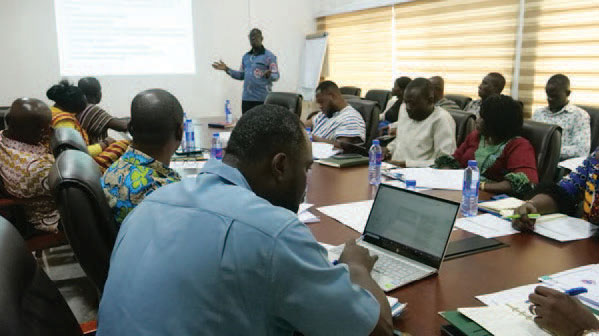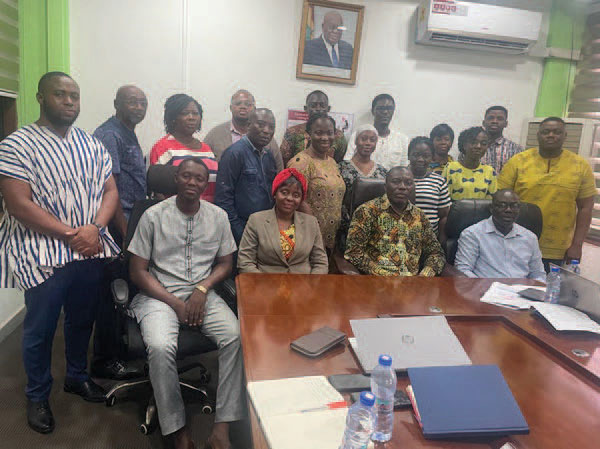HYBRID WASTE
Project Detail
The aim is to scale up to draw up business case models to drive its replication in other communities in Ghana. For CSIR-STEPRI, a key pending task in addition to community engagement activities (completed) is to develop a comprehensive policy guideline that will serve as a blueprint for various ministries and agencies for waste-to-energy project initiatives in Ghana.
- Collaborating institutions/partnership: University of Rostock, Germany; German Biomass Research Centre gGmbH; SRH Berlin; Gicon GmbH, Germany; West African Science Service Centre on Climate Change and Adapted Land Use (WASCAL); CSIR – The Institute of Industrial Research (IIR); Kwame Nkrumah University of Science and Technology (KNUST); University of Energy and Natural Resources (UENR); Ministry of Environment, Science, Technology & Innovation (MESTI)/ GIRC CENTRE; Kumasi Technical University (KsTU); The Centre for Energy, Environment, and Sustainable Development (CEESD).
- Duration:January – December 2023
- Funding source (donor):The Federal Ministry of Education and Research of Germany (BMBF)
Participating scientists (with PI)
Specific Objective
The aim is to scale up to draw up business case models to drive its replication in other communities in Ghana. For CSIR-STEPRI, a key pending task in addition to community engagement activities (completed) is to develop a comprehensive policy guideline that will serve as a blueprint for various ministries and agencies for waste-to-energy project initiatives in Ghana.
Expected Outcome
It is anticipated that at the end of the project, conversion of waste to a resourceful renewable energy such as biogas and other components such as organic fertilizers, plastics pellets would have been fully integrated into the solid waste management in Ghana at the Metropolitan, Municipal and District level.
- Showcase the novelty of hybrid solarbiogas-pyrolysis systems both at the national and international level for a wider uptake.
- Changed perception of the people on the value of waste generated from households, institutional and industrial activities with the potential of being converted into more resourceful products.
- Promote the concept of waste segregation at the households and institutional into waste management system thereby reducing the quantity of waste being dumped into landfill sites.
- Improved environmental and general sanitary conditions at the implementing municipality
- Create avenues for job creation along the entire waste management and energy generation value chains
- Build capacity of local experts in the designing, construction and maintenance of a waste to energy facility.
- Contribute to the inclusion of renewable energy in Ghana’s electricity generation mix.
Major Outcomes
Desk study on reviewing various policy documents for the waste and energy sectors in Ghana brought to the fore the various policy gaps which need to be addressed for a successful implementation of Waste-to-energy initiatives.
- The project provided data and information which inform the review and development of policy guidelines for the conversion of waste to renewable energy in Ghana.
- Identification and mapping of stakeholders as well as expected role(s) for an effective and efficient waste-toenergy subsector.
- Awareness creation on the value of waste generated in the implementing municipality with the potential of conversion to energy and other resourceful products.
- Promotion of waste segregation in the both first and second cycles schools in the municipality.
- The assessment of the level of Knowledge, Attitude and Practice (KAP) of waste management at the household level formed the basis for the project implementation.
- The project has brought to the for various business potential along the Municipal waste value chain.
Impact on the Economy
In the short term, the project has changed the perception of waste and value associated with it. By extension generated jobs in waste collection and segregation for utilization by the waste to energy plant. In the long term it is going to contribute immensely towards effective and efficient municipal waste management in Ghana. Again, it is envisaged that, the current high cost of waste collection, transportation and disposal incurred by the MMDAs would be reduced drastically with the adoption of these technologies in the waste management system.
Again, it is also contributing to Ghana’s climate change mitigation and adaptation strategy in line with the Sustainable Development Goals by increasing the renewable energy component in Ghana’s energy mix.
Again, it is also contributing to Ghana’s climate change mitigation and adaptation strategy in line with the Sustainable Development Goals by increasing the renewable energy component in Ghana’s energy mix.
Major policy action needed
- Wider stakeholders’ engagement on the waste-to-energy policy guideline for awareness creation and education at the district and regional levels.
- Ministerial Consultation and Policy Makers engagement meetings on policy direction for conversion of waste to energy
- Initiate the Ministerial and Cabinet approval process for the adoption of the developed conversion of Waste-to-Energy policy guidelines as a national document to guide all Waste-to-Energy initiatives in Ghana.








